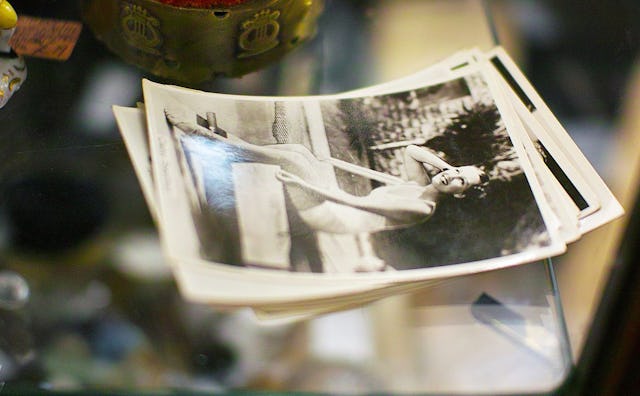The Fear of Forgetting, and of Being Forgotten

“Oh, I don’t care—May-gen or Meh-gan, either is fine,” I answered.
“You must be one or the other!” she insisted. “How do your parents pronounce it?”
I opened my mouth to answer, then stopped. To my horror, I couldn’t remember.
I’m always surprised when I realize how long it’s been since my mom died—15 years now. It seems unthinkable that the number of years I’ve been motherless are starting to catch up with the number of years I had a living mom. And my dad will have been gone five years this June. Impossible.
They say that time makes loss easier to handle, and in a way I suppose I agree. The gut-wrenching early grief gives way to a sort of dullness that’s more possible to bear over the long run. When I dream about my parents now—which I still do, regularly—I no longer grieve fresh all over again when I wake up. Instead I feel a sense of good fortune, as though one of them personally visited me in the night—a little warm “hello, there” from the great beyond.
But then there’s the other side of the coin: the uncomfortable, unbelievable truth that after a while, you begin to forget things you’d really like to remember. Like, for example, the way my parents said my name.
There’s plenty I still remember keenly about my mom and dad: the way my mother smelled after her bath or the scent of my dad’s leather coat laced with lingering smoke from his evening Benson & Hedges. I clearly remember my dad’s laugh, his booming sneeze, the way he sounded when he called the dog. My mother’s voice, too, cracking with emotion as she sang along with her favorite Harry Chapin songs or said “I love you” before hanging up the phone.
But either of them saying my name? Those memories are almost there, but just out of my grasp, like a swirling cloud that won’t quite form a shape. Along with a thousand other memories I can no longer access on demand, my brain seems to have marked this one as less relevant than all of the details and sounds of my current day-to-day life.
There’s a scene in the movie Beaches where Barbara Hershey’s character, Hilary, suffering from terminal cancer, sorts frantically through a box of photos. “I can’t remember my mother’s hands!” she repeats, frenzied. Finally, Bette Midler’s character, C.C., helps Hilary find a photo showing her mom’s hands, and she visibly relaxes. Even as a young teenager—the age I was when I devoured this movie again and again—I got the symbolism: Hilary was terrified that her daughter might begin to forget her, just as she had begun to forget her mother, one body part or conversation slipping away at a time.
The fear of forgetting is inexorably intertwined with the fear of being forgotten.
A friend recently shared with me a rather depressing but truthful quote from English graffiti artist Banksy. Roughly paraphrased, it says you die twice: the first time when you stop breathing, and the second time, when someone says your name for the last time.
Maybe, I thought, there’s a third time: when the people who brought you into the world—who created and named and watched and nurtured you—are both gone. After all, who will remember my first words, my first steps, my toddler temperament, now that my parents no longer exist? May-gen or Meh-gan. Which one am I? Only my parents can say—or, I guess, could have said—for sure.
Or maybe not. My older siblings and aunts and uncles, my grandma and stepmom, my parents’ oldest friends … they’re all here to piece “me” together, maybe not the whole picture, but enough. Maybe, by losing them both early, I just learned in a particularly harsh way what everyone has to learn at some point: My parents brought me into the world and gave me a name, but what I do with it is up to me.
So how did I answer my curious acquaintance? After a few seconds of mental scrambling, I thought of how my older brothers and sister, and my grandma and stepmother and aunts and uncles say my name. I thought about what I prefer to be called. And I had my answer.
“May-gen,” I said, firmly.
I’m pretty sure that’s how my parents said it, too. It would be nice if the last person who ever says my name gets it right, but if they don’t? I still have the scent of my dad’s coat and the sound of my mom’s voice singing “Taxi.” And my family and friends who will never forget me completely, even if some details get lost along the way. They are the ones still saying my name today…even if they don’t always pronounce it right.
This article was originally published on